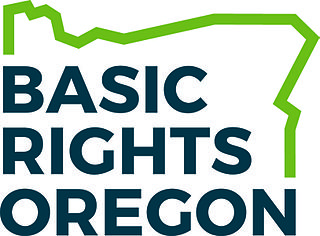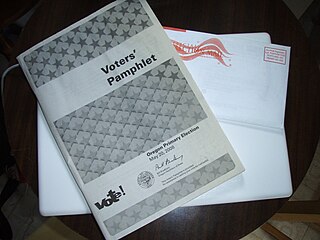Ballot Measure 7, an Oregon, United States ballot initiative that passed with over 53% approval in 2000, amended the Oregon Constitution, requiring the government to reimburse land owners when regulations reduced the value of their property.

Oregon is a state in the Pacific Northwest region on the West Coast of the United States. The Columbia River delineates much of Oregon's northern boundary with Washington, while the Snake River delineates much of its eastern boundary with Idaho. The parallel 42° north delineates the southern boundary with California and Nevada.

The United States of America (USA), commonly known as the United States or America, is a country comprising 50 states, a federal district, five major self-governing territories, and various possessions. At 3.8 million square miles, the United States is the world's third or fourth largest country by total area and is slightly smaller than the entire continent of Europe. With a population of over 327 million people, the U.S. is the third most populous country. The capital is Washington, D.C., and the most populous city is New York City. Most of the country is located contiguously in North America between Canada and Mexico.
In United States constitutional law, a regulatory taking is a situation in which a government regulation limits the uses of private property to such a degree that the regulation effectively deprives the property owners of economically reasonable use or value of their property to such an extent that it deprives them of utility or value of that property, even though the regulation does not formally divest them of title to it.
It was overturned by the Oregon Supreme Court, [1] but Measure 37 in 2004 was largely similar. Measure 37 differed from Measure 7 in several key ways:

The Oregon Supreme Court (OSC) is the highest state court in the U.S. state of Oregon. The only court that may reverse or modify a decision of the Oregon Supreme Court is the Supreme Court of the United States. The OSC holds court at the Oregon Supreme Court Building in Salem, Oregon, near the capitol building on State Street. The building was finished in 1914 and also houses the state's law library, while the courtroom is also used by the Oregon Court of Appeals.
- Measure 37 did not amend the Constitution.
- Measure 37 gave government the option to waive regulations, rather than reimburse a property owner.
- Measure 37 was retroactive.
Voters in neighboring Washington had considered a similar measure, Initiative 164, in the mid-1990s, but did not pass it. [2]
Oregonians In Action ran the campaign supporting Measure 7, after taking it over from Bill Sizemore's organization, Oregon Taxpayers United. [3] 1000 Friends of Oregon opposed Measures 7 and 37.
Oregonians in Action (OIA) is an organization in Oregon, United States that seeks to reduce land use regulation. There are four legal entities that have used this name, but the one that is most active as of 2006 is the political action committee. Its committee number is 2793. It has existed since 1989, but gained prominence when it took over the campaign for Ballot Measure 7 in 2000.

Bill Sizemore is an American political activist and writer in Happy Valley, Oregon, United States. Sizemore has never held elected office, but has nonetheless been a major political figure in Oregon since the 1990s. He is considered one of the main proponents of the Oregon tax revolt, a movement that seeks to reduce taxes in the state. Oregon Taxpayers United, a political action committee he founded in 1993, has advanced numerous ballot initiatives limiting taxation, and has opposed spending initiatives. Sizemore made an unsuccessful run for Governor of Oregon in 1998. He also announced his intention to run for governor in 2010, but was indicted by the state on charges of tax evasion. The charges were later amended to failure to file tax returns.
1000 Friends of Oregon is a private, non-profit 501(c)(3) organization that advocates for land-use planning. It was incorporated on October 11, 1974, following the creation of Oregon's statewide land-use system in 1973 by then-governor Tom McCall and attorney Henry Richmond. By 1994, the organization had about 2,500 contributors and supporters. Richmond served as the organization's first executive director.







